Enjoy this 15 minute guided meditation for relieving loneliness.
Category: Uncategorized
VIDEO: Grief in Uncertain Times with Laura Ward
Laura Ward, Bereavement Counselor, explains how Grief might be showing up for you right now. She will also share heartfelt ways that you can incorporate wellness habits into your daily routine.
Grief and Wellness in Uncertain Times: Facebook Live Series
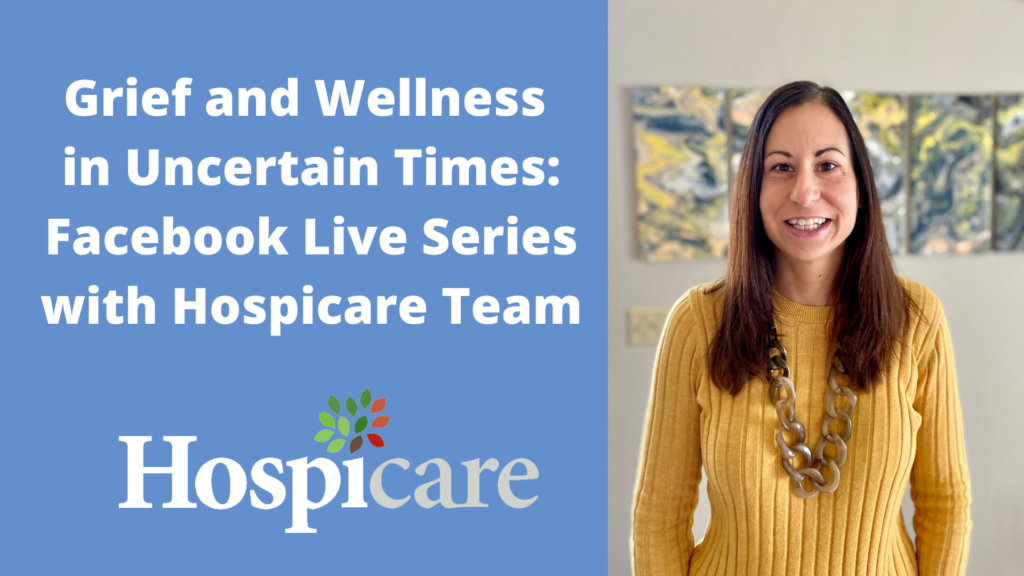
Grief and Wellness in Uncertain Times – Online Support for Hospicare Community
Our team will share resources and guided wellness practices for our extended Hospicare family. All programs will be recorded live on Facebook and will be available after on our Facebook page, blog (hospicare.org/blog) and our Instagram page (@hospicareNY).
***Grief in Uncertain Times***
Monday March 23, 2020 12:00-12:15pm
Join Laura Ward, Bereavement Counselor, to learn about Grief and how it might be showing up for you right now. She will also share heartfelt ways that you can incorporate wellness habits into your daily routine.
***Wellness in Uncertain Times***
Join us for our bi-weekly 15 minute wellness sessions (Tuesdays and Thursdays at 10am). Presentations are by our interdisciplinary Hospicare team. Series will continue until we are able to host our support groups again (currently on hold till 4/15)
Tues March 24, 10am – Guided Meditation with Laura Ward
Thurs March 26, 10am – Breathing for Relaxation with Sara Worden
Tues March 31, 10am – Therapeutic Harp with Jayne Demakos
Thurs April 2, 10am – Tools for Senior Isolation with Jen Gabriel
Tues April 7, 10am – Spiritual Guidance with Edie Reagan
Thurs April 9, 10am – Gentle Stretching with Sara Worden
Tues April 14, 10am – Therapeutic Harp with Jayne Demakos
All programs will be recorded live on Facebook and will be available after on our Facebook page, blog (hospicare.org/blog) and our Instagram page (@hospicareNY).
Series is free but donations are appreciated. https://www.hospicare.org/donate/
Questions? Please contact Sara Worden, Assistant Director of Community Engagement at sworden@hospicare.org
Cortland Hospice Foundation Welcomes New Board Members
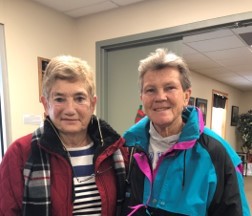
The Hospice Foundation of Cortland County (HFCC), a nonprofit foundation that supports Hospicare, welcomed two new board members in 2020: Nancy Wainwright and Evelyn Sammons.
A resident of the Cortland area for more than five decades, Evelyn Sammons is a past board member for HFCC and for Hospicare. Now retired after a 30-year career with the Homer School District, Evelyn enjoys reading, hiking and biking. She is a strong advocate for hospice, believing that all patients and families in the Cortland area can benefit from the full range of services available to them, including grief counseling.
Nancy Wainwright, a resident of Cortland County for 70 years, served as secretary for the Marathon Elementary School for over two decades. Nancy enjoys traveling, reading and spending time with family. She views her volunteering as a way to “pay forward” her gratitude for the hospice services her family members have received in the past. Nancy is also a strong advocate for fundraising, understanding that philanthropy helps patients receive exceptional care.
Hospicare thanks the entire HFCC board for the ways in which they support Hospicare’s mission!
Hospicare is a Lifeline
By Mark Stevens
Ann and I met in 1987 when we were Graduate students in the Yale school of Drama. Ann was in her first year of the 3-year program and I was in my second. Because of the intensity of the program it is not hard to imagine that our paths would cross almost immediately. I’m not sure what it was that attracted us to each other. Our common ground and sense of humor I’m sure was a major part of it, but we became fast friends. And even in the most stressful of times we could find laughter in the situation or in the myriad of problems we encountered along the way.
There was one time that we worked together on the same production of Shakespeare’s “The Tempest”. Ann was in charge of a particular set piece that can best be described as a windmill consisting of three steel pipes that extended below a raked show deck and attached to the floor Ann and I spent about two hours alone under the deck drilling holes and attaching the legs to the floor. Two hours that consisted of work, yelling, laughing and enjoying each other’s company. Two hours that helped developed a bond that would last for the two decades.
After I graduated in 1989, I moved to Los Angeles, California to work as the Technical Director at the University of Southern California (USC). Because of a change in positions after the first year, I moved up in the ranks and was able to hire a someone to work beside me to teach and design the technical aspects of the many productions. Ann was an accomplished academic, with and undergraduate degree in theatre and history, and after 3 years decided to return to school to pursue her PHD in the History of Science and was accepted in the program at Princeton University. Ann and I resigned our positions with USC and moved to New Jersey to begin the next act of our lives. Over the next few years and in no particular order we got married, taught at two different Universities and finally moved to Columbia, South Carolina and to work at the University of South Carolina. Over the next 11 years Ann worked as an Associate Professor in the History Dept and I worked for the Dean of the Honors College and then for the Dean of Arts and Sciences.
During those 11 years Ann’s scholarship, reputation, hard work and dedication led her to being offered her dream job as an Associate Professor in the Science and Technology Studies at Cornell. While Ann was a respected researcher and writer, teaching students was her passion. At Cornell, she finally had the chance to focus on both with a support by the University and her fellow professors that she never found anywhere else. I’d never seen her as happy professionally, and both faculty and students adored her, lining up to try to get into one of her classes.
When we lived in Columbia Ann had suffered from fibroids in her ovarian track, but surgery had taken care of them and regular scans had eased our minds that they would be caught quickly if they returned. Ann’s health was something we would watch, but we never obsessed. For the next few years before the offer to move to Ithaca Ann went for checkups twice a year and always got an “all clear”.
July 2016 was our second summer in Ithaca. I’m not sure what day it was now but Ann woke me one morning complaining about pain and asking me to take her to Emergency Room. If you knew Ann, and she said she was in pain, you knew this wasn’t something minor. So, we got up got dressed and headed across the lake to the hospital. We didn’t realize it then, but that morning began our longest journey together.
The trip to the emergency became a long day of scans and tests and the discovery that the fibroids were back, Ann was quickly scheduled for surgery at the center in Buffalo. After the surgery, the surgeon pulled me into a private area and told me he’d successfully removed the fibroids but couldn’t remove a large mass that was involving a larger area.
Ann and I had been married for 21 years and were best friends for even longer. We had experienced so many adventures together, both good and bad. But this was a situation that you can’t really relate to unless you go thru it.
The type of cancer Ann had was known as – endometrial stromal sarcoma — a rare form, affecting a small number of women worldwide. Ann had a lot of grit and was determined not to allow this disease to keep her from her commitment to her role at the university as a teacher and scholar. So, while she continued to fulfill her duties in the office and in the classroom, she began on a daily regimen of oral chemotherapy. Every day for the next 3 months, I drove her to campus so she could teach, and then pick her up and drove her back home an hour later. Most often she would retire to the bedroom with her laptop and do work until she fell asleep
The drugs took a terrible toll on her and after a month and a half it was obvious the drugs weren’t working, and a car trip to a world-renowned cancer hospital NYC yielded no new possibilities for treatment. A car trip that was extremely uncomfortable not to mention nauseating when we went thru the Lincoln tunnel.
Ann’s condition began to deteriorate at the beginning of December and when we went for a weekly appointment, Ann’s oncologist ordered a blood transfusion. This was the second type of transfusion she went thru we were not that unduly alarmed at this happening again, but then when you are in the situation and going through this type of thing what is normal? It was decided that she would be there overnight so since there was nothing I could do I went home to take care of the dogs and came back first thing the next day That morning as Ann and I sat talking in her room, one of her doctors arrived to talk to us. “There’s not much else we can do,” And that she was going to go home.
Ann and I looked at each other. And we had a long talk with the doctor. He was there for a long time making sure we both understood the whys and wherefores. Much of it wet in one ear and out the other. And suddenly we were alone in the room. I remember I stood up and was staring out the window for a long time and we said nothing. Then a memory came to me and I turned back to her as she laid in the bed is said. “you remember when we were under the deck putting in that stupid windmill or whatever it was”? And she nodded. “I thought of that the other day. Not sure why. But I remember how cool it was under the show deck. I remember how quiet it was in the theatre except for us laughing. Isn’t that funny? I remember it, like it was yesterday. And I after a while I turned back to her and said, “I wish it was yesterday”.
That was December 5. Six days later, Ann would be gone.
I had barely heard of Hospicare. You never think about something like hospice until you need it. Our doctor suggested Hospicare in Ithaca made some calls, and it was explained that Hospicare’s Residence was full. Another option would be to bring Ann home, but that worried us. Our 16-year-old son Evan was in the throes of exams at school, and we worried about the long-term effect it would have on him, as well as other members of our family who began to arrive. But we learned that we could have the full hospice services delivered right to Ann’s hospital bed.
At the time, I felt I was standing at the edge of a cliff, leaning over a dark abyss, lost and unsure of what to do. Then someone grabbed my belt and held me steady. I turned around to see who it was, and there was Hospicare. Every nurse, aide, and volunteer we met felt like an angel.
The whole experience is set up to help make a difficult transition a little easier. It’s not easy at all, of course. It’s terrible. Hospicare was established for that purpose. The purpose of helping with care of your loved one but also in helping the immediate family members like us with the process of transition. A help that was tirelessly and patiently explained in every detail and with all manners of help along the way.
Ann passed away on Dec 11, 2016 and it was devastating to Evan and myself. After Ann’s death, Evan and I found it difficult to talk to each other. In fact, there were times we didn’t talk at all. I had no way to understand what was happening in his soul, and he had no way to understand what was happening in mine. We didn’t yet know that it was okay to be sad. Or angry. Or hurt. Or furious. Or lost. Evan gave up playing sports, which was a passion he’d held since childhood. I spent every day feeling like I was walking around in a dense fog. Wanting to find the right words to say but not knowing how to form the words
We felt very alone. After a while, people didn’t know what to say when they saw us. Evan said it best: “People want you to feel better because they want to feel better. They don’t want to deal with it anymore, and just want you to be okay.” But we were not OK. We were stuck dealing with it all the time, 24 hours a day.
But a lifeline was there. We started meeting with Laura, one of Hospicare’s bereavement counselors. One of the very first things Laura said to us was that it’s okay to feel awful. Those emotions are the things that make us human.
From there, and in a beautifully subtle and compassionate way, Laura began giving us little tips to help us relate to one another. She brought positivity and light back into a world that felt so hopeless. Eventually, Evan and I saw that we could find a way out of the darkness and together we could find our paths toward healing. Similarly, I began to attend some of Hospicare’s group sessions. In those conversations, I listened to other people’s struggles. came to understand the depths of hurt. And it may seem strange, but those groups sessions help you to see and feel that you are not alone. You are not alone in a raft in the middle of a sea.
Every time I interacted with Hospicare it was like finding a little building block. Over time all those little building blocks construct a new normal. Both of us began to climb out of the darkness and see the sun. Evan returned to sports the next year. He became a captain of the high school swimming team and traveled to the state championships in his last two years of high school. And he was on the varsity Lacrosse team for 3 years. Because of everything he experienced thru Hospicare, and how it took care of his mom in those last days, he dedicated himself to working in healthcare and is now studying to become a nurse at Utica College
Does all of this mean I’m done grieving Ann? No. I think about her every day. There are still times when I would wonder and wish why she would walk in the room to share something with me. There are a thousand little things that remind me of her constantly. You never get over this kind of loss; you just make friends with the ghosts and be happy with the memories.
More people need to understand what Hospicare is doing in the community. It’s an incredible organization that provides a safety net for people like me. It’s part of what makes this area such a good place to call home. That’s why I tell my story here. Evan and I have volunteered for the past two years now during “Women Swimming for Hospicare”, and we feel good about giving back to the organization that gave so much to us.
Even though you may not have known it, the support you give to Hospicare meant you were supporting myself and Evan and the many families during the most difficult time of our lives. Thank you.
Ann was recently honored at the University of South Carolina.
How to Support a Grieving Friend
By Laura Ward
A poignant piece of fiction by blogger Kathryn Wallace has been making the rounds on social media. In the story, Pooh and Piglet realize that they haven’t seen Eeyore in a long time and decide to check in on him. In a glum voice, Eeyore explains that right now he feels, “rather Sad, and Alone, and Not Much Fun To Be Around At All” and that is why he hasn’t bothered them, because he assumes that they would not want to hang out with someone who is feeling this way. To Eeyore’s surprise, Pooh and Piglet sit down on either side of him. The three friends sit in silence and almost imperceptibly Eeyore starts to feel a tiny bit better because Pooh and Piglet are there. No more; no less.

As a bereavement counselor, I find that grievers often feel a similar sense of isolation. Friends who were initially very supportive and present following a death return to their own lives. Meanwhile, grievers struggle to cope with their new reality and a roller coaster of emotions. It is common for bereaved people to express frustration with their ability to cope “effectively” and the resulting loss of esteem can lead them to assume that others could not possibly understand or accept them in their current state. In the wake of loss, the life, identity and worldview of the grieving person has changed dramatically. They are having to reorganize themselves around the death of a person who had become an integral part of their identity, a buoy on their life journey. Their struggle to adjust, although intense, is a normal part of grief. Mourning the death of someone with whom we have had a significant attachment is a natural, biological process, one which occurs over years, not days or months and is a necessary part of integrating the loss. The path through grief is fraught with difficult and complex emotions. This path is one that we will all walk at some point in our lives, it’s not something we choose, but rather something that arises from having loving relationships.
Research has clearly demonstrated that humans are automatically wired to be both helpful and empathetic. When someone we care about is grieving, we genuinely want to find a way to offer comfort, but we may struggle to find the right sentiment or gesture. The truth is that there is no “fix” for grief, no perfect thing to say that will make it better, and it’s true that you might say the wrong thing even with the very best of intentions. Alan Wolfelt, Ph.D. explains that companioning a grieving friend is “going into the wilderness of the soul with another human being; it is not about thinking you are responsible for finding the way out”. In grief, the wilderness of the soul can be fraught with feelings of uncertainty, a loss of control, ambiguity, sadness and anxiety. As humans, these are all emotions we tend to avoid, naturally preferring the light and predictable. Therefore, our instinct is often to help our friend find their way out of this uncomfortable place rather than simply be there with them. There is no greater gift we can give another person than to accept them, exactly where they are at any moment, without expectation. Be comforted in knowing that your friend has an innate ability to heal, albeit on their own timeline. Your role is to be responsive and respectful of their unique process and show up in whatever way you are able.
What role you play depends on the type of relationship you and your friend have established. Are you someone who can elicit a quick laugh or enjoy a night on the town? It may be a while before your friend will be able to feel joy, but at some point, they will need to take a break from their grief, have fun and share that laugh. Be patient but keep in touch with your friend and let them know that you would like to spend time with them when they are ready. Verbalize your support if they need to cancel or leave an outing early. Are you someone who shows your love by doing things for others? After a death, the list of tasks that need to be completed can be overwhelming. You can ease the burden by assisting with daily chores such as meals, lawn care and cleaning or by helping plan the funeral or memorial service. Continue your offers of help long after the death and if it’s something that you can do without asking, then just do it. Lastly, if you are a Pooh or a Piglet and have the capacity to journey into the wilderness with your friend, to sit silently and offer emotional comfort, then let love and tenderness lead the way. Regardless of the type of support you can provide a grieving friend, it matters, having people offer support during our darkest times is what gives us the strength to go on and is an integral part of our healing process.
16th Annual Women Swimmin’ – we made a splash!
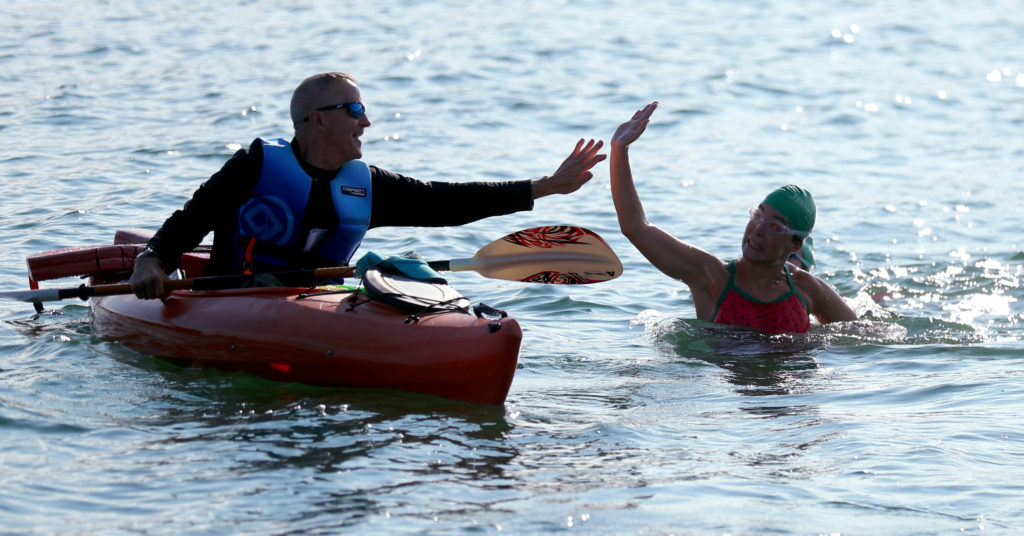
WOW! We did it! YOU did it!!
340 lake and lap swimmers, 170 escort boaters, 172 volunteers, hundreds of spectators, 4,000+ donors… and more than $415,000 raised for Hospicare & Palliative Care Services!
Our hearts are full with gratitude and awe, and we are glowing. We hope you are, too. This community is exceptional!
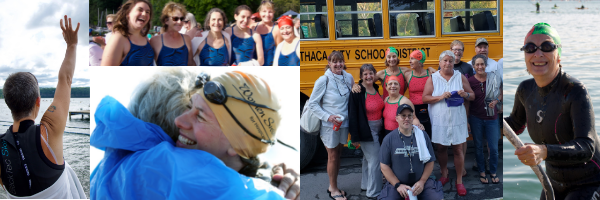
We did it, and we raised over $435,000 dollars!
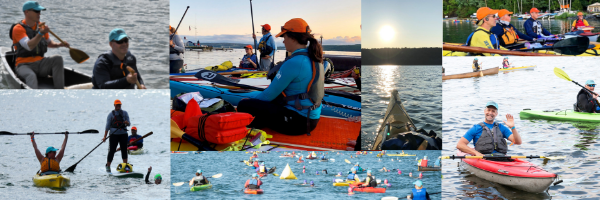
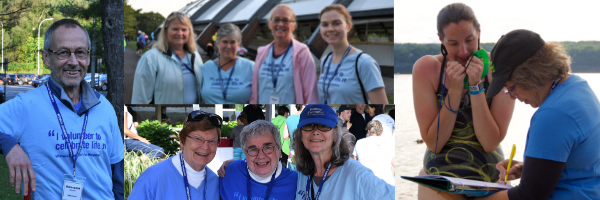
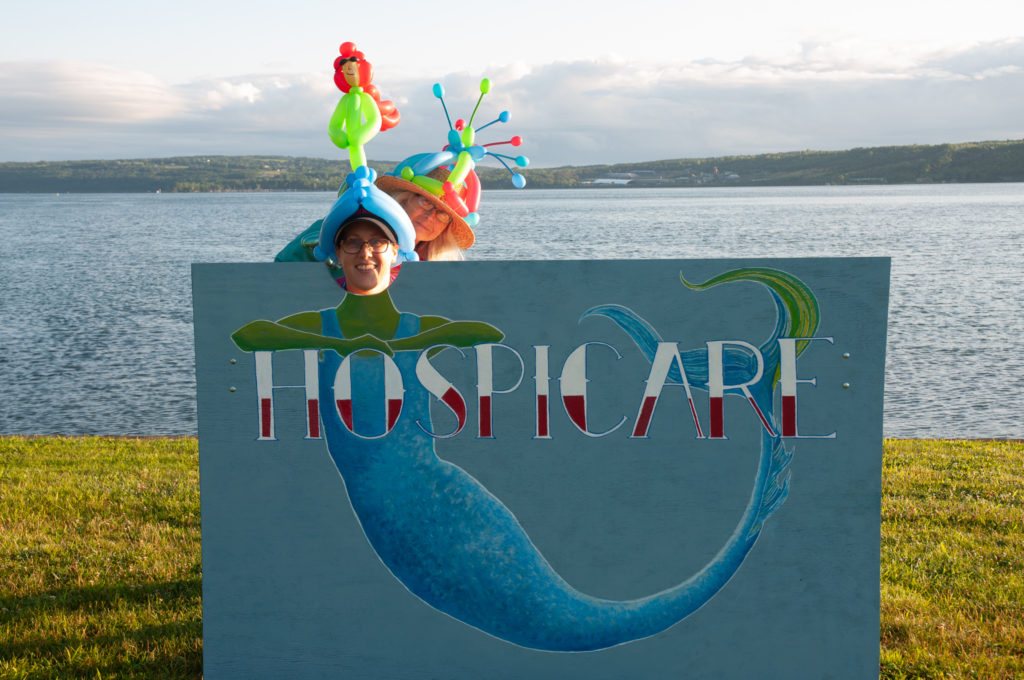
Our New Accessible Paths
It’s been an exciting month here at our residence! We had an amazing crew of volunteers who worked together to build an accessible path to our pond-side gazebo.
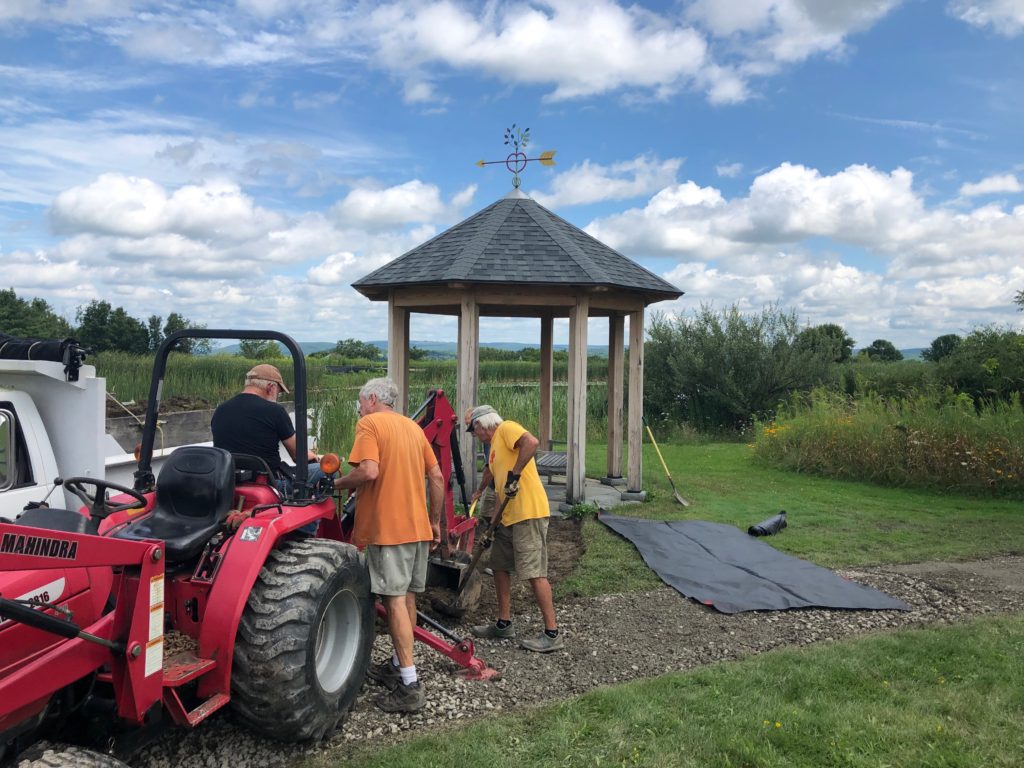
Last fall, a gift from a generous local family lead to the construction of a beautiful gazebo at the edge of the pond at our residence on King Road. Unfortunately, the paths from the residence to the gazebo were in need of significant repair to make them safer and easier for wheelchair and walker access.
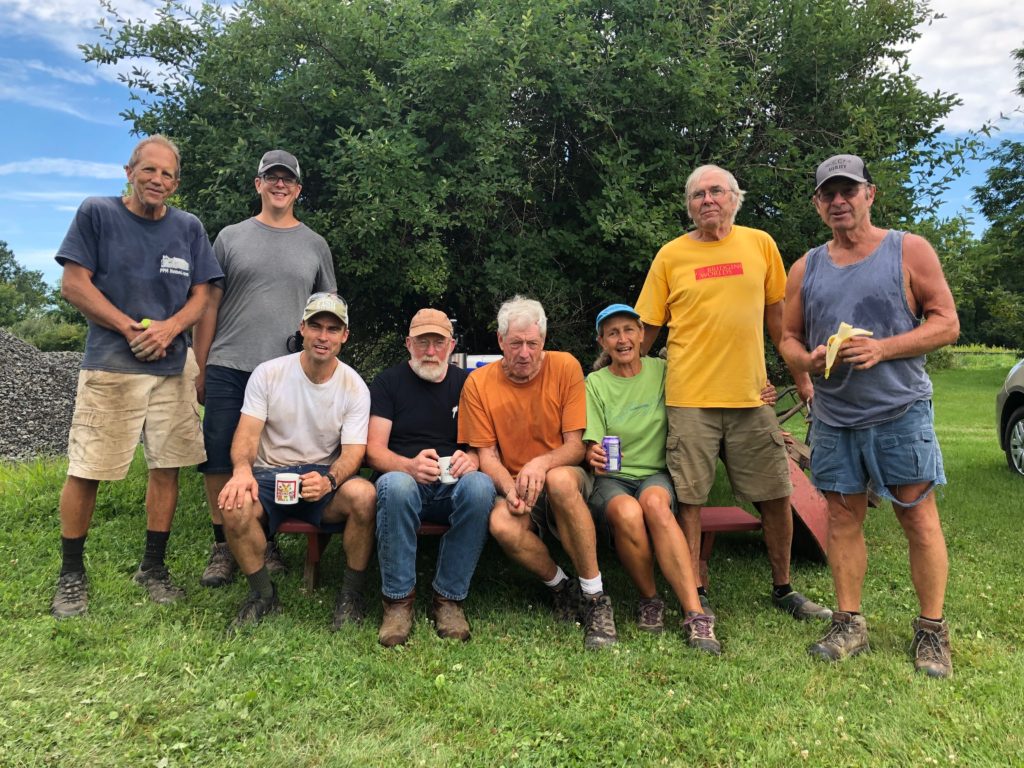
Many thanks to Alan Vogel for organizing, Connie O’Brien, Hospicare Nurse, for the hard work (and the delicious blueberry bread), all the volunteers (Ed Cope, Greg Van Ness, Andy Moore, Bruce Vann, Connie O’Brien, Andy Boehm, & Bruce Fearon). Plus, FLX Property Services and JC Smith for donating machinery.
AND to the generous support of our community through our Giving is Gorges fundraiser.
It truly takes a village! Please feel free to come by anytime and walk the new pathways and gardens.
Hospicare welcomes five new Board Members!
We are so fortunate to have such a committed board! We have five new board members who have been involved with Hospicare in one way or another for years, and are now strengthening their commitment to serving our community. Please join us in welcoming…
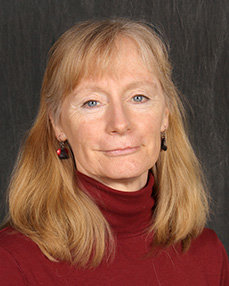
Barbara Ganzel, PhD, LMSW, is a clinical social worker and research neuroscientist, and has been the director of the Ithaca College Gerontology Institute since 2016.
She has 20+ years of experience in the study of stress and its impact on brain, body, and behavior across the lifespan. Previously, she was the principal investigator and director of a neuroimaging laboratory at Cornell University in Ithaca. She has published in Psychological Review, Journal of the American Medical Association, American Journal of Psychiatry,The Gerontologist, NeuroImage, Psychology and Aging, and the Journal of Traumatic Stress, among others. Dr. Ganzel’s current work focuses on non-pharmacological ways to reduce stress and symptoms of psychological trauma for people at or near the end of life. She is a founding member of the National Hospice and Palliative Care Organization’s Trauma-Informed Care Work group, whose goal is to define, educate, and support the provision of trauma‐informed end‐of‐life care.
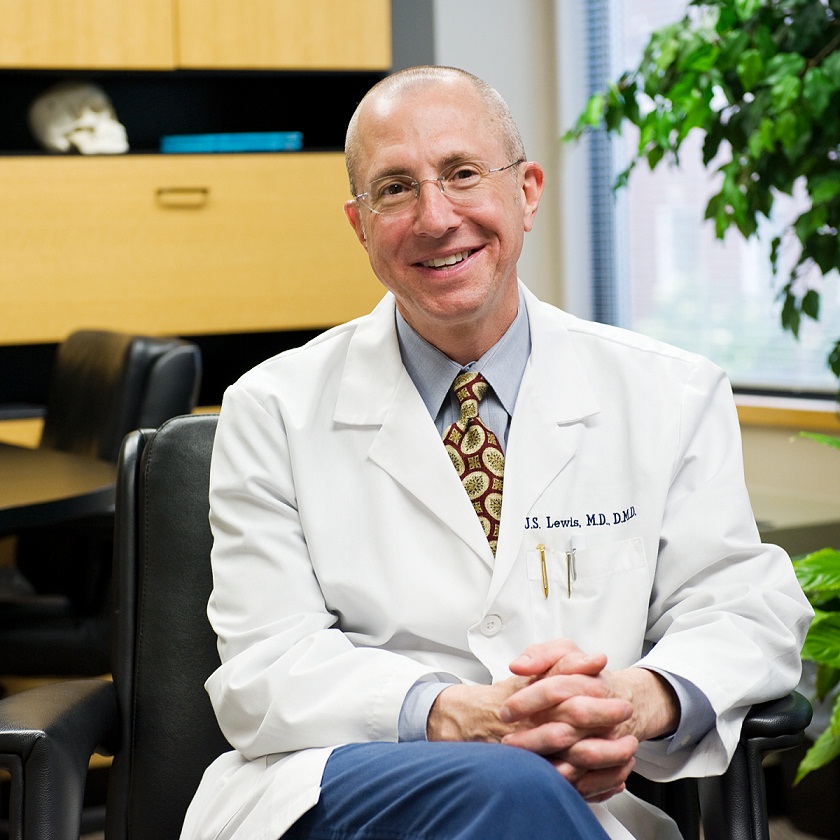
Jeffrey S. Lewis, M.D.,D.M.D is a Board Certified Oral and Maxillofacial Surgeon and Facial Cosmetic Surgeon who, after 32 years of operating on people, retired from clinical practice in December, 2018 to become full time Medical Director at Racker.
Dr. Lewis is the founder and director of the Cayuga Medical Center Cleft Palate and Facial Deformities team and clinic. Dr. Lewis was on the faculty of the University of Rochester School of Medicine and Dentistry for over two decades, has authored several text book chapters in his specialties, has published in peer reviewed journals and has been a Board Examiner for the American Board of Cosmetic Surgery. His private practice in Ithaca, Cayuga Facial Surgery, was opened in 1994 and he has been on the medical staff at Cayuga Medical Center since 1994. Dr. Lewis serves on the Ethics Committees for both Hospicare and Cayuga Medical Center and will now join the Board at Hospicare.
Dr. Lewis has been married to his wife, Kristin, for 33 years. They have a son, William, who recently graduated from Johns Hopkins University, and a daughter, Anna, who will matriculate at Elon University in August. In years past, Dr. Lewis toured the US extensively on motorcycles and has been an avid sailor. He plays bass guitar in the band Spy Donkey.
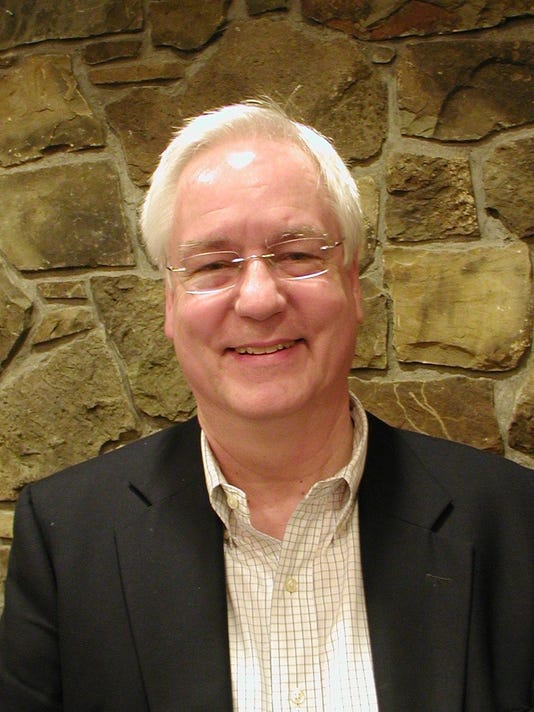
Joe Mareane, former Tompkins County Administrator, brings 40 years of experience in local government, policy, and economic development.
Joe is recently retired and looking forward to using his time and energy to support Hospicare’s mission to bring compassionate care to Tompkins and Cortland Counties.
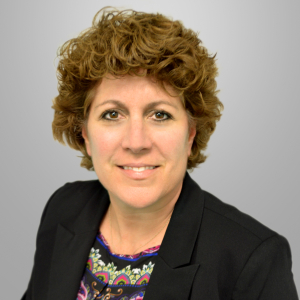
Eliza Mulhern, a resident of Cortland, has been practicing law in New York State since the late 1990s.
Eliza is Associate General Counsel and Vice President of Compliance at CFCU Community Credit Union. She is responsible for the oversight of the Credit Union’s Legal Department, Compliance Department and Information Security Department. Eliza has been active in her community, serving on the Habitat for Humanity of Tompkins and Cortland Counties board for 6 years and volunteering with other various local organizations.
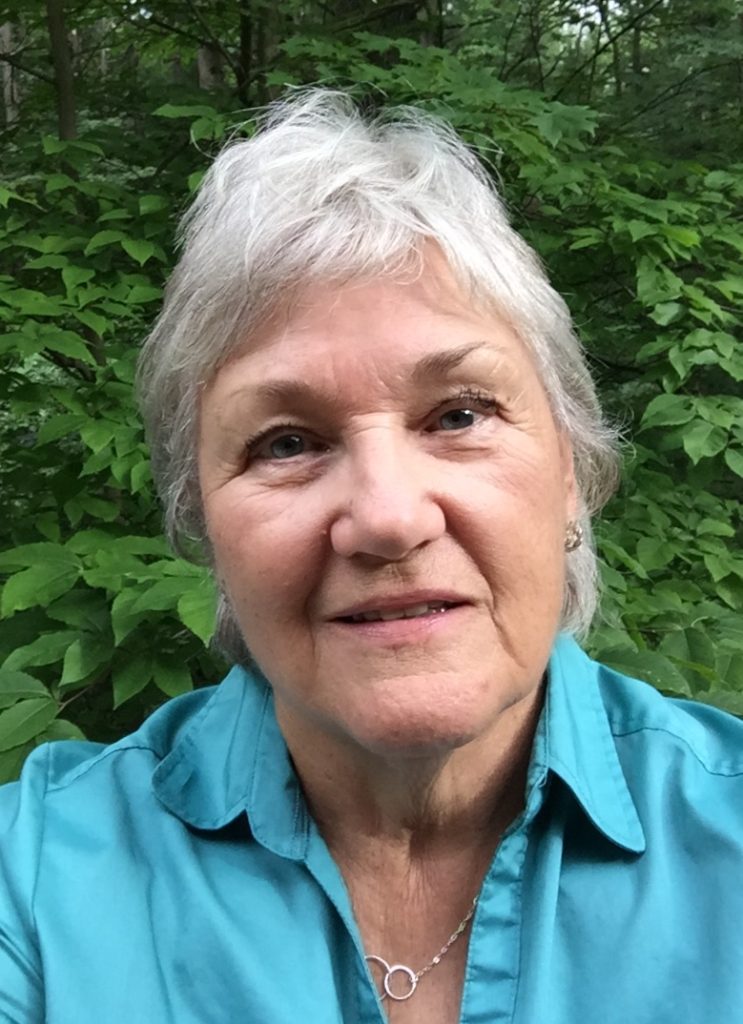
Linda Plummer Wagenet is returning to the Board after being a member and Board Chair several years ago. She has served on the Ethics committee and the Women’s Swimmin’ committee in the past and is currently on the Finance committee.
Linda is retired from Cornell University. She is also Vice President of the Small Comforts Foundation and serves on the Water Resources Council of Tompkins County. Linda is originally from California and has family in Ithaca as well as Austin, TX.
Our volunteers are integral to the support we give to patients and families. In 2018, patient care volunteers – 121 in total – spent 4,042 hours supporting patients, caregivers and families. These trained volunteers were joined by 300+ community volunteers who serve on the Board or committees, help with fundraising initiatives and assist with events, including Women Swimmin’ for Hospicare. To find out information about getting more involved email wyettru@hospicare.org.
Hospicare Announces New Executive Director
The Board of Directors of Hospicare & Palliative Care Services is pleased to announce the successful hiring of a new Executive Director. Kimberly De Rosa will join the Hospicare team at the end of April.
“The Board and staff are unified in their support of Kim as the next leader for Hospicare & Palliative Care Services,” said Loren Gardner, president of the Board of Directors. “Kim’s 15 years of experience in senior leadership positions in healthcare and hospice has prepared her to lead Hospicare and its incredible and dedicated staff and volunteers as we work to provide end-of-life care to members of our community.”
For the past five years, De Rosa has served as the Director of Operations for Hospice and Palliative Care at Mission Hospital in Asheville, NC. In this role, De Rosa designed, led and implemented strategic initiatives and programs that increased productivity by 25% and patient satisfaction by 33%. Prior to this position, she worked for a decade as the Director of Business Services for Hematology Oncology Associates of CNY.
De Rosa has a B.S. with a concentration in Business Administration from Capella University, and is slated to receive her Executive MBA from the Rochester Institute of Technology in May 2019. She has been an active volunteer for the Big Brother, Big Sister Organization and Eblen Charities, and she is a current board member at Hospice of Western North Carolina. Kim, her husband, and their two Labrador Retrievers look forward to relocating to the Finger Lakes, where they also can enjoy being closer to family.
De Rosa succeeds Dale Johnson, who served as Executive Director for Hospicare & Palliative Care Services for the past decade. Roger Sibley, former Executive Director of Franziska Racker Centers, has served as interim Executive Director since December.
Hospicare & Palliative Care Services serves residents of Cortland and Tompkins counties. Our hospice team cares for patients’ medical, emotional and spiritual needs so they can more fully enjoy time with loved ones. Our palliative care team cares for people with life-limiting illnesses by relieving the burden of illness, enhancing the quality of life, and fulfilling the patient’s goals for comfort. Finally, we provide bereavement support services to anyone in our service area who is grieving the death of a loved one, whether or not they died on hospice.
Anyone interested in learning more about our services and programs can call 607-272-0212 during our administrative business hours (M-F, 8:30am-4:30pm).